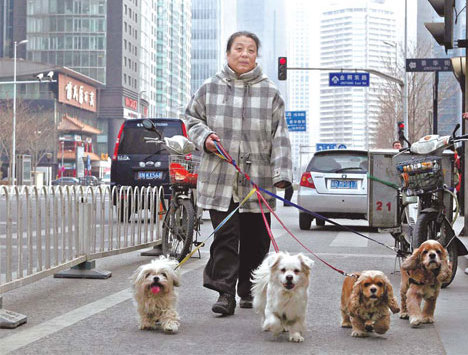-
News >China
Netizens wag tails over pet pooch tax
2010-07-13 07:12
A woman walks her dogs in the CBD area of Beijing. [File Photo]Beijing - The majority of participants in a recent online poll agreed with the collection of a pet dog tax, though experts warned it was not a final solution to the problems involved in keeping pets in cities.
A Nanjing netizen recently proposed levying a 500 to 5,000 yuan ($75-750) "dog tax" fee on owners to keep the canine community from swelling in China's urban areas. The proposal attracted widespread attention.
According to statistics released by the Ministry of Health in 2009, there are five dogs for every 100 people in China's urban areas, with a total of 75 million pet dogs, of which less than 20 percent have been vaccinated against rabies.The disease, which is responsible for the deaths of more than 2,400 people each year, has become one of the biggest public health hazards in China, the Ministry has warned.
The research organization D3fang polled 1,114 Internet users in China on the subject of urban dogs, and 55 percent of those surveyed said they are annoyed by pet dogs and suggested that stricter regulations be imposed on keeping dogs in cities.
Among the rest of the respondents, 41 percent said they have no objections to dogs being kept as pets in urban areas, while 4 percent said they are unconcerned with the issue.
Despite their varying attitudes on the subject, two-thirds of the respondents agreed there are simply too many dogs in urban areas.
To keep a rein on the number of dogs in urban areas and continue to manage the situation, 64 percent of the respondents agreed with the imposition of a tax on pet dog owners.
A respondent who uses the handle "chenjing", of Suzhou, Jiangsu province, said: "Many people have dogs in my community. The barking is annoying and it is irritating whenever a loose dog licks my legs."
It was not the first time the suggestion of imposing a dog tax has buzzed around the Internet. A similar discussion took place in 2009 on Tianya.cn.
Jiang Deming, of eastern Jiangsu province, who is a deputy to the National People's Congress, China's top legislature, also submitted a proposal in 2007 on enacting a law to regulate urban pet dogs, in order to balance the interests of pet dog owners with the rest of the urban population.
Dog owners should pay tax to share the costs incurred by cities to manage keeping canines as pets, Jiang said in an interview with Xinhua News Agency.
However, some disagree with the idea of imposing a tax on pet owners as the solution.
"More urban dogs create more problems," Hu Xiaowu, a sociologist at Nanjing University, was quoted by the Modern Express as saying. "The tax will have less influence on the affluent than on those who are less well off but want to kept a dog."
A 28-year-old dog owner, surnamed Feng, from Beijing, complained that dog owners are already annually charged to register their pets.
"The initial fee is 1,000 yuan for the first year and 500 yuan each year thereafter. Where does the money go?" she asked.
An employee of the China Small Animal Protection Association told China Daily: "Urban dog owners did not want to pay to have their dogs castrated, which is why their numbers continue to increase."
Meanwhile, Shen Ruihong, secretary-general of the China Beijing Kennel Club, warned that even if the tax is approved, it will still take time for the policy to be implemented and regulated.
"People should be charged less for raising dogs, but be fined for being negligent in supervising them," he said.
